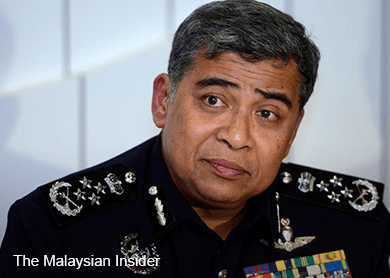
(May 27): The police are discussing with Thai authorities the possibility of accessing the mass graves in Padang Besar, Perlis from the other side of the border, Inspector-General of Police Tan Sri Khalid Abu Bakar said today.
He said the rough terrain in the area and rainy weather have hampered access to the site from the Malaysian side.
"We are in the midst of negotiating with Thailand to use a route there to access the site using vehicles and to bring out whatever we will find on location."
"Today my officer will go to Sadao and discuss with the Thai authorities... because this is rainy season and the area is not accessible," he told a press conference in Kuala Lumpur.
Khalid also did not rule out the possibility of authorities being involved in the human trafficking case, and police would take statements from all quarters.
"We will take action regardless of who is involved in this," he said adding that police still do not know the exact number of bodies because they had yet to dig the graves.
He added that police were confident that no more graves would be found as they had done a thorough screening and combed the area from Tangga Seratus to Kampung Wai which was not accessible by vehicles.
"We are confident that there are no more graves or camps set up for immigrants."
Yesterday, Home Minister Datuk Seri Ahmad Zahid Hamidi said local authorities may be complicit in causing the deaths of the people found buried in the mass graves, and that police were investigating the matter.
Zahid said police had yet to ascertain the identities of some 100 bodies found in the mass graves and that the police forensic team was currently conducting tests to determine if the remains were Rohingya or Bangladeshi victims of human trafficking
Earlier this month, the ministry denied reports claiming the existence of holding camps and mass graves of illegal ethnic Rohingya migrants on the Malaysian side of its border with Thailand.
Its secretary-general Datuk Alwi Ibrahim said investigations carried out by the police had found no such camps or graves in Malaysia.
After the discovery of "death camps" in southern Thailand, there have been news reports saying that there might be similar slave camps housing illegal immigrants on the Malaysian side of the border.
More than 1.3 million Rohingya – viewed by the United Nations as one of the world's most persecuted minorities – live in Myanmar's western Rakhine state.
Fleeing persecution, these refugees usually make their way to Malaysia on rickety boats via people smugglers.
After coming under fire for turning away refugees adrift at sea after being abandoned by the smugglers following a crackdown by Thai police on normal smuggling routes, Malaysia together with Indonesia on May 20 announced that they would no longer turn away the boat people. – The Malaysian Insider